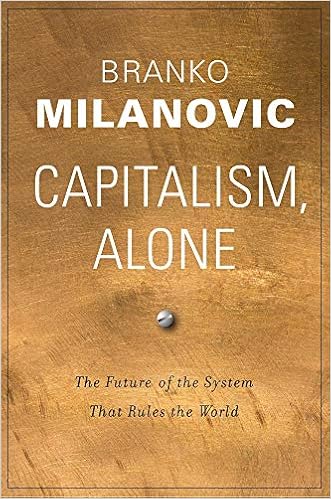9 Best Books on Inequality – Why Capitalism Failing?
Are you looking for wealth inequality books? This is a trending topic since we feel this “inequality” on our own skin during the months of the pandemic. We feel insecure, many of us have no savings, we loose (or lost) our job while we see people who are just laughing about this whole situation slurping their cocktail on their private yacht (thank you Instagram).
Some weeks ago I discovered a website that tries to demonstrate how wide this “wealth gap” is. If you have time, it is worth scrolling (use arrows).
[iframe src=”https://mkorostoff.github.io/1-pixel-wealth/” width=”100%” height=”600″]
In this list article we tried to collect the most important books and authors in this topic, and why not start with the latest releases? At least, you will get some new or practically applicable ideas or concepts relevant to these domains. Keeping this in mind, here are the top inequality books:

Capitalism, Alone: The Future of the System That Rules the World, by Branko Milanovic
Economist Branko Milanovic has consistently challenged assumptions about who benefits from globalization. In his paradigm-shifting book The Haves and the Have-Nots, he argues that Americans are the world's most affluent people. But in this follow-up volume, Milanovic makes a further surprising claim: A new global middle class of upwardly mobile professionals is developing, with a shared consciousness of its own identity and common interests. In clear, accessible prose, Milanovic examines the phenomenon of a global capitalism in which individuals, corporations, and even nations are increasingly driven by the profit motive.
The ascent of capitalism has been aided by several factors, including the spread of English as the global language. But the most important has been the unprecedented flow of people from poorer to richer countries. Globalization is now bringing about a reverse movement, as poor countries try to export their people to richer countries. This is the first book to argue that the second phase of globalization will be driven by capital, not people. While political struggles, terrorism, and changes in geopolitics are usually seen as the prime movers, the author shows how economic factors will be dominant. The book starts with a review of the history of capitalism, its ideology, and its current phase of globalization. It then focuses on how migrants are exploited by capital, and on the resulting conflict between capital and labor in the rich countries. There is also a discussion of the role of the military in globalization and its links to terrorism. Finally, Milanovic lays out a plan for the future, showing how the conflict between capital and labor could be resolved and how both rich and poor countries could benefit.

Capital and Ideology, by Thomas Piketty
This is a worth-reading book if you want to know the history and growth of economic inequality. It elucidates economic inequality based on history and offers remedies to level it. The author, Thomas Piketty, has expressed his belief of novel participatory socialism based on the philosophy of education, power and knowledge sharing, and social property.
He has asserted that wealth tax must exist to ensure lasting property as well as wealth circulation. He has further revealed that partial wealth must go back to the public to have a new beginning.
According to the author, our economy is not natural. Capital, markets, and returns are ancient concepts that differ as per the choices. He explores the physical and conceptual relations of conflicting social groups, which are responsible for colonialism, slavery, and communism.
He determines that the important driver of human advancement over the centuries is the struggle for education and equality instead of the claim of property rights or the hunt for stability. The novel age of extreme inequality has progress since the 80s, which is considered a retort to communism but is also the result of politics and ignorance.

Young, Broke, and Educated, by Alexander Baima
A fresh new book on this topic primary from the perspective of education. Somebody born wealthy and the majority isn't. We don't start from the same situation.
In 2020, 70% of American college students end up taking out loans for school expenses. The average graduate finishes school with around $30,000 in debt. That's not equality. School and education should be offered for non-worker youngsters at no (or low) cost. It's not ok, to push younger generations into a lifetime dept. The book offers great insight into today’s world of education, business life, government motives and personal finance.
Alexander Baima, an online business and blockchain expert, shows the most problematic parts of why capitalism failing, step-by-step. The author also offers solutions how this situation could be changed for future generations.

Growth in a Time of Change: Global and Country Perspectives, by Hyeon-Wook Kim and Zia Qureshi
This is the first book out of the two dedicated to a research project reporting new economic growth issues as well as challenges due to the continuing considerable change in the global economy. The project is the brainchild of the Korea Development Institute and the Brookings Institution.
Focusing specifically on technological transformation as one of the strong solutions, the book is split into two parts. The first part studies the primary elements of change, which is based on an international perspective. It examines investment shifts, technological changes, and demographic transitions and how they impact global economic growth.
Different global economy scenarios are analyzed, as the digital development triggers quick changes, including influences on capital flows, income distribution, and growth.
The second part reveals new growth issues from the viewpoint of an individual but a major economy, which the book considers as South Korea. It examines how technological changes and macroeconomic advances affect the behavior of companies as well as households.
In simple words, how they affect the decision to capitalize, save, and use. You will find both Korea-specific and international trends as well as opportunities.

Organic Wealth: Create Your Own Slice of Pie, by Donald Ax
If you are looking for something creative and unique that is practically applicable to the current era, consider reading this book.
It is a common belief that wealth distribution is unfair. However, this book by Donald Ax is based on the fact that wealth is not distributed but is created. It explains that if an individual makes wealth, the money pie only multiplies and does not stop other people from getting their pie slice.
The book shows how to make wealth that was never there and how doing so has boundless potential and how to build the wealth gap without taxes. It also reveals why the progressives’ wealth tax is undemocratic, how the intent of the framers was to proportionate all direct taxes, and how a loophole was made by the court to yet take wealth.

The Velvet Rope Economy: How Inequality Became Big Business, by Nelson D. Schwartz
If you have lived in the U.S. anywhere in the past 30 years or are living at present, this is a great book to comprehend the true impact of class partitions. Even at present, politics is passionate about the growing wealth division, which plays a role in daily life. This is explained well with real examples.
It is a fact that the onset of the Velvet Rope Economy has terminated the democratization. So, what is this Velvet Rope? Well, it employs class segregation as per one’s socioeconomic status so that commercial setups can profit. Just recall that fast pass facility at amusement parks that just a handful of families or groups can afford and better seats at a higher price system at a sporting event.
You will come across many such real examples in this book by Nelson D. Schwartz, of which, most will be familiar. If not, they might act as an eye opener. Distinguishing treatment and privileges due to socioeconomic status is evident even in healthcare, airline services, and education institutions.

Engine of Inequality: The Fed and the Future of Wealth in America, by Karen Petrou
For decades, the Federal Reserve’s monetary policy has had a direct and damaging effect on economic equality. While the central bank focuses on stabilizing the market, regular Americans suffer. The Fed’s actions deepen inequality through their effects on the housing market. The central bank’s policies hold back the recovery of the housing industry, which has left families struggling to afford homes. The Federal Reserve also props up the stock market, helping the wealthy become even wealthier. But, as experts like President Obama’s former Chair of the Council of Economic Advisors, Christina Romer, have recognized, the Federal Reserve could follow a policy that actually helped average Americans. In Engine of Inequality, Karen Petrou offers pragmatic solutions for creating more inclusive monetary policy and equality-enhancing financial regulation as quickly and painlessly as possible.

Grow the Pie: How Great Companies Deliver Both Purpose and Profit, by Alex Edmans
A business should be responsible, shouldn’t be? Such a business can let go of profits for better social results to eradicate inequality. However, one cannot deny the fact that while serving the society, the companies also need to generate profit for retirees, employees, investors, and multiple funds.
When it comes to wealth and income inequality, a million-dollar question is: Should companies operate for a rationale or revenue? The answer is given in this book by Alex Edmans, which is fair. It says companies can fulfill both and shows the way to do so. This is based on accurate evidence, not aspirant thinking; it needs a framework to practice the rationale, says the book.
The further pages explain how policy makers, policy influencers, managers, stakeholders, and investors can revive society of inequality and how the inhabitants can contribute to it. Established on the real examples and reliable evidence traversing across nations and industries, the author strongly says that there is no choice here. Companies are capable of rendering both social value and profit.
According to the book, the highly prosperous companies do not keep profit as the direct goal but keep a purpose for the same. This purpose is to serve a communal need and ensure betterment.

Capital in the Twenty-First Century, by Thomas Piketty
We start and finish with Thomas Piketty simply because the French author is the most important thinker in this topic in 2020. We appreciate his thoughts and the clear description of the current macroeconomic situation we are experiencing. Capital in the Twenty-First Century was his main work published in 2017. This is a must-read book in this field despite it's length.
Conclusion
The above economic and non-fiction inequality books describe the symptoms and possible solutions, but it's clear in 2021 after the “first” part of the pandemic, that capitalism failing. It failed us (lower and middle class people), our daily life changed radically and the stress is enormous, not just because of the fear of loosing our job, but when we read the news that Elon Musk earned $25 Billion in one day with his stocks, it shocks us. Something clearly doesn't work and the Universal Basic Income (UBI) won't solve this problem.
In order to understand why is this so urgent, see the next diagram how inequality changed between 1900 to 2010.

We see that the wealthy 10% in the US lost a lot during the wars and we may felt, that this won't return, but what we really see that the top 10% owns almost 50% of the wealth in the country. The “elephant” chart originates from Branko Milanovic (see his book above).
We need to find an answer from these books on inequality to solve the weakness of capitalism and to create a better world to our children.
My profession is online marketing and development (10+ years experience), check my latest mobile app called Upcoming or my Chrome extensions for ChatGPT. But my real passion is reading books both fiction and non-fiction. I have several favorite authors like James Redfield or Daniel Keyes. If I read a book I always want to find the best part of it, every book has its unique value.







